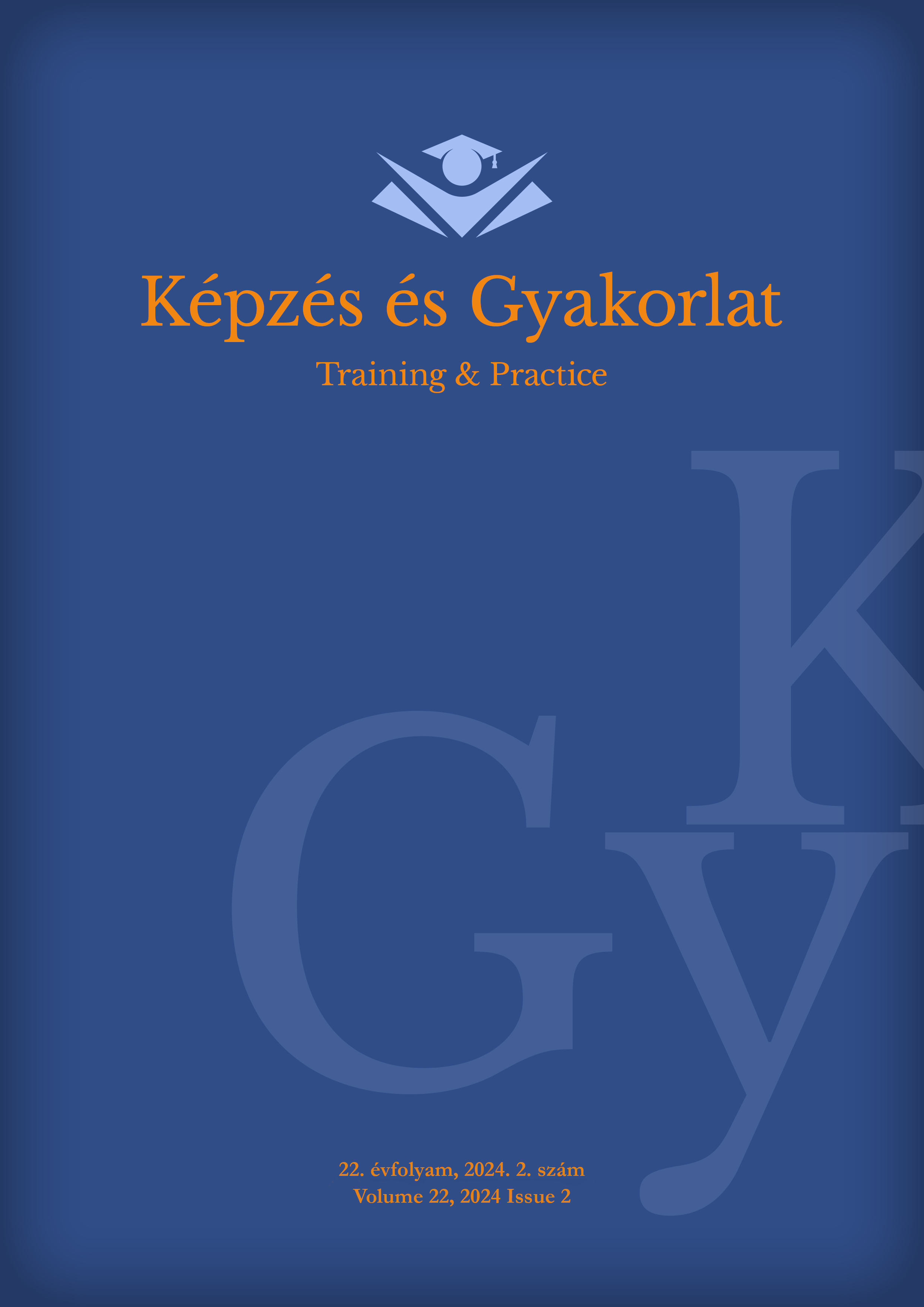The role of mentoring activities in teacher training – lessons from a pilot study conducted amongconductor-teacher specialist students
DOI:
https://doi.org/10.17165/tp.2024.2.56-69Keywords:
mentor, early career teacher, career socialisationAbstract
The role of a mentor in the life of a school is clearly significant. Since the initial experience of a new teacher is a crucial factor in determining whether or not he or she remains in the profession, the quality of the mentoring is not irrelevant. In teacher education, the training school is the place where students put into practice the theories they have learned in higher education. Both the institution and the teachers who mentor them are of great importance, since it is here that a teacher trainee first encounters the teaching profession ’live’. Using the literature already published on this topic and further reflecting on it, I explored the attitudes of the students of the Pető András Faculty of Conductor-Teacher Specialisation at Semmelweis University towards external practice, their opinions on mentoring, the impact of the mentor-student relationship on the success of the practice, and the factors influencing the career socialisation of the students. I identified their needs and the help and support they expected from their mentor.
References
Czető, K. (2010). Összefoglaló áttekintés a hazai gyakorlatvezető mentortanár-képzésekről. In M. M. Nádasi (Ed.), A mentorfelkészítés rendszere és próbája, a mentorképzés szakterületi előkészítése II. kötet (pp. 45–72). ELTE Eötvös Kiadó.
Di Blasio, B., Paku, Á., & Marton, M. (2011). A mentor, mint kapuőr a tanári professzió kialakításában. Új Pedagógiai Szemle, 61(11–12), 183–193.
Falus, I. (2003). A pedagógus. In I. Falus (Ed.), Didaktika – Elméleti alapok a tanítás tanulásához. Nemzeti Tankönyvkiadó.
Hunya, M., & Simon, G. (2013). A gyakornokok támogatása. Szakirodalmi összefoglaló 1–25. Oktatáskutató és Fejlesztő Intézet. https://ofi.oh.gov.hu/sites/default/files/attachments/t315_mentor_ szakirodalmi_osszefoglalo.pdf
Jáki, G. (2010). Tanárjelöltek és pályakezdő tanárok mentorálása az iskola világában. In M. Nádasi (Ed.), A mentorfelkészítés rendszere és próbája, a mentorképzés szakterületi előkészítése II. kötet (pp. 73–105). ELTE Eötvös Kiadó.
Kállai, G., & Szemerszki, M. (2015). Pedagógushallgatók a képzés elején. Educatio, 24(1), 123–128. http://www.edu-online.eu/hu/educatio_reszletes.php?id=106
Káplár-Kodácsy, K., & Dorner, H. (2017). Felnőttkori tanulási modellek a reflektív gyakorlat szolgálatában. A mentori munka, mint felnőttkori tanulásszervezési forma. Neveléstudomány, 5(3), 31–49. https://doi.org/10.21549/NTNY.19.2017.3.3
Kolb, A.Y., & Kolb, D.A. (2011). The Kolb Learning Style Inventory - Version 4.0. Experience Based Learning Systems, Inc.
Kotschy, B. (2009). Új elemek a tanárképzés rendszerében. Educatio, 18(3), 371–378.
Kotschy, B. (2011). Mentorálás – A pályakezdő tanárok támogatása. Interjú Kotschy Beátával. In E. Szegedi (Ed.), Alma a fán: Fókuszban a tanulás támogatása (pp. 40–46.) https://tka.hu/docs/palyazatok/alma_a_fan_-_fokuszban_a_tanulas_tamogatasa_2014.pdf
Kotschy, B., Sallai, É., & Szőke-Milinte, E. (2016). Mentorok tevékenységének támogatása, Segédanyag a köznevelési intézményekben dolgozó pedagógusgyakornokok mentorainak. Oktatási Hivatal.
Koukounaras-Liagkis, M., Karavas, E., & Papaioannou, M. (2024), "Using the “most significant change” technique to evaluate the teaching competence and psycho-emotional development of prospective teachers during the teaching practicum", International Journal of Mentoring and Coaching in Education, 13(3), 295–312. https://doi.org/10.1108/IJMCE-04-2023-0037
Nádasi, M. (2010). Tanárjelöltek, pályakezdők, vezetőtanárok a tanárrá válás kritikus szakaszairól. Tapasztalatok bemutatása In M. Nádasi (Ed.), A mentorfelkészítés rendszere és próbája, a mentorképzés szakterületi előkészítése II. kötet (pp. 105–113). ELTE Eötvös Kiadó.
Nádasi, M. (2011). A mentorképzés tartalmáról. In M. Nádasi (Ed.), A mentorfelkészítés rendszere, próbája, a mentorképzés szakterületi előkészítése III. kötet (pp. 7–16). ELTE Eötvös Kiadó.
Relihan, M.C., & O'Donovan, R. (2024). "Putting the cart behind the horse: conceptualising the “emotionality” of mentoring in initial teacher education", International Journal of Mentoring and Coaching in Education, 13(4), 511–526. https://doi.org/10.1108/IJMCE-07-2023-0070
Sági, M. (2010). Tanárjelöltek oktatással kapcsolatos nézeteinek alakulása a tanítási gyakorlat folyamán. Empirikus vizsgálat. In M. M. Nádasi (Ed.) A mentorfelkészítés rendszere és próbája, a mentorképzés szakterületi előkészítése II. kötet (pp. 115–140). ELTE Eötvös Kiadó.
Simon, G. (2013). A gyakornokokat támogató rendszer koncepciója Elméleti alapvetés OFI TÁMOP-3.1.5/12-2012-0001 Pedagógusképzés támogatása 19. http://ofi.hu/sites/default/files/attachments/ t315_gyak_tamrendsz_koncepcio_130708.pdf
Szivák, J. (1999). A kezdő pedagógus. Iskolakultúra, 9(4), 3–13.
Szivák, J. (2003). A kezdő pedagógus. In I. Falus (Ed.), Didaktika - Elméleti alapok a tanítás tanulásához. Nemzeti Tankönyvkiadó.
Szivák, J. (2011). A reflektív gondolkodás fejlesztése. In M. Nádasi (Ed.), A mentorfelkészítés rendszere, próbája, a mentorképzés szakterületi előkészítése III. kötet (pp. 126–136). ELTE Eötvös Kiadó.
Szivák, J., Lénárd, S., & Rapos, N. (2011). Mentor és tanárjelölt az összefüggő egyéni gyakorlaton – módszertani ajánlás. In M. M. Nádasi (Ed.), A mentorfelkészítés rendszere, próbája, a mentorképzés szakterületi előkészítése III. kötet (pp. 17–37). ELTE Eötvös Kiadó.
Downloads
Published
Issue
Section
License
Copyright (c) 2024 Perger Katalin

This work is licensed under a Creative Commons Attribution-NonCommercial-NoDerivatives 4.0 International License.












